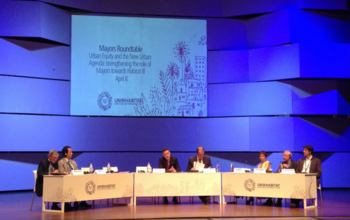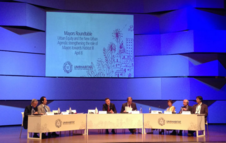
By Josephine d'Allant's blog
Source: urb.im
Cheikh Gueye, the Deputy Mayor, Dakar, Senegal, opened the roundtable by emphasizing the impact that being a mayor has on transforming leaders: "it’s so demanding, so complex, and yet so fulfilling." She also asked the other mayors whether they have a "Medellin urban forum," or a "Nairobi, or Dakar urban forum" - a space in which local actors can share and learn from each other, just like we're doing here at WUF7.
The Mayor of Medellin, Aníbal Gaviria Correa, called for strengthening the role of mayors: mayors should be part of the main institutions that guide and manage nations, especially considering that urbanization rates will reach 75 percent in just a few years.
Bas Verkerk, the Mayor of Delft, Netherlands described the inequality in his city: despite Delft's strong emphasis on technology and innovation, 40 percent of residents live in social housing, and there is a high rate of unskilled workers. Mayor Verkerk described two solutions – one educational, and one that deals with unemployment. In primary schools, the government pays for technology classes, to introduce important concepts at an early age, and in secondary schools, they introduce job shadowing to help youth chose a promising career path. To combat unemployment, a law has been put in place so that employers must hire local, unemployed candidates. Today, 8-10 percent of all of Delft's workers come from this quota.
Carolina Toha Morales, the Mayor of Santiago de Chile, detailed three policies that reduce urban inequality, and that depend largely on local authorities. First, she lamented the common phenomenon of poverty moving to the outside of cities. Santiago is fighting this segregation by moving the poor to the center of the city. In terms of transportation, 100 percent of Santiago privileges the 30 percent that drives cars - this has to change. Finally, she emphasized access to all-inclusive, safe, public spaces in order to change the paradigm of poverty.
Budapest's Deputy Mayor, Gábor Bagdy, focused on two of his city's approaches to reducing inequality: raising the income of the poor, and increasing the availability of public services. The municipality hires unemployed residents at a wage lower than minimum wage, helping them avoid being excluded from the labor force. The city also reduces the prices of public services so that they are available to all.
Fernando Haddad, the Mayor of Sao Paulo, detailed two of his city's initiatives that reduce inequality by providing the poor with more free time, and more work opportunities. The recently implemented bus-only lane system saves the average commuter 19 minutes a day, which adds up to 80 hours a year. Sao Paulo also gives tax incentives for companies investing in low-income areas, providing more opportunities for these neighborhoods.
The Mayor of Barcelona, Xavier Trias, described how the recent economic crisis in Spain has created new ideas of poverty and exclusion, with 17 percent of Barcelona's residents living below poverty level. He emphasized the importance of cities working together and with other actors in order to succeed with reductions in inequality.
Finally the Deputy Mayor of Nanjing, Bing Lu, described how his city has fostered the development of public transportation services – 46 percent of residents use public transportation for their daily commute, and six more metro lines are under construction. He ended by inviting all of his fellow mayors and their families to the Youth Olympic Games, to be held in Nanjing in August.











